Ever wondered if your furry friend’s bathroom breaks could help save the planet? At Oh Crap, we’ve dug deep into the backyard of Australia’s dog ownership to uncover something spectacular. And yes, it’s about more than just picking up poop.
With a wag of a tail and a mission in heart, we embarked on a journey to sniff out the eco-friendliest states for dog owners down under. Why? Because our beaches, parks, and backyards deserve more than just love; they need us to be environmentally paw-sponsible.
Through a combination of our in-house data and a bit of number crunching, we’ve mapped out a trail of eco-conscious decisions across the states. Ready to see where your state stands? Let’s dive into the nitty-gritty, or should we say, the gritty of the nitty, of how Aussie dog owners are turning poop into hope.
Contents
The Eco-Friendly Pawprint: How Australian States Compare
Why Should Dog Owners Care About Being Eco-Friendly?
In a world where plastic bags lead the pack in landfill marathons, making the switch to compostable dog poop bags isn’t just a step but a giant leap for pet-kind. Every bag counts in this tail-wagging race against waste. But let’s dig deeper into the gritty reality that surrounds us and our four-legged companions.
Every month, an astonishing 180 million dog poop bags are used across Australia, the majority of which are plastic. To put this into perspective, if you were to place last month’s used poop bags end to end, they would go around the world one and a half times. Most of these are plastic, and frankly, that’s a load of crap. Discovering this may be disheartening, especially for dog owners like us who treasure our planet. The thought of using another plastic poop bag becomes, well, quite frankly, a bit of a stinker.
Oh Crap was born out of a desire to scoop up this issue and toss it in the bin for good. The mission is to eradicate the 4% of landfill that is dog poop wrapped in plastic bags, which, let’s face it, is a barking mad way to treat organic waste. And yes, biodegradable dog poop bags are just plastic bags in disguise.
Embracing compostable dog poop bags isn’t just an eco-friendly choice; it’s a commitment to turning our poop into a force for good. As the guardians of our furry friends and our beautiful planet, making the switch is a no-brainer. Let’s lead the pack towards a cleaner, greener future, one poop at a time, because being eco-friendly is totally the poop!
So how eco-friendly is each state around the country?
Unveiling Oh Crap’s Methodology: A Deeper Dive Into Data
Before diving into our findings, it’s important to understand the approach behind our analysis. At Oh Crap, while we’re passionate about sustainability, we’re equally committed to rigorous data analysis. By examining nearly 100,000 orders and analysing 7 years of website data, we set out to measure the eco-friendliness of dog owners across Australian states.
Our first step was normalising our findings against population data to ensure a fair comparison across states. We used the latest population statistics from the Australian Bureau of Statistics as of June 2023. This allowed us to calculate the number of compostable dog poop bags used per person in each state, providing a clear measure of eco-efficiency.
This method doesn’t just throw numbers around; it aims to create a meaningful comparison that highlights which states are ahead in adopting sustainable practices and encourages a friendly rivalry to inspire further progress. Let’s explore how each state ranks in embracing eco-friendly pet ownership.
Interpreting State Rankings: Understanding Eco-Friendly Efforts
Curious to see where your state lands in our eco-friendly rankings? We’ve condensed our analysis into an easy-to-understand table that outlines the eco-efficiency of each state. Here’s what you need to know to navigate the findings:
- Score: Indicates the average number of compostable dog poop bags used per capita, serving as a direct measure of eco-friendliness within a state. A higher score signifies a stronger commitment to sustainability among dog owners.
- Ranking: Provides a straightforward ranking of the states, from the most eco-conscious to those with room for improvement, based on their scores.
This concise overview not only highlights the commendable efforts of some states but also shines a light on areas with potential for growth. It’s a call to action for all of us to contribute to a cleaner, greener future, one step at a time.
Who’s Leading the Eco-Friendly Pack?
When it comes to making eco-friendly choices for our furry friends, some states are showing us how it’s done, leading the pack with impressive commitments to sustainability. Here’s a glimpse into the states setting the pace and those gearing up to make their mark.
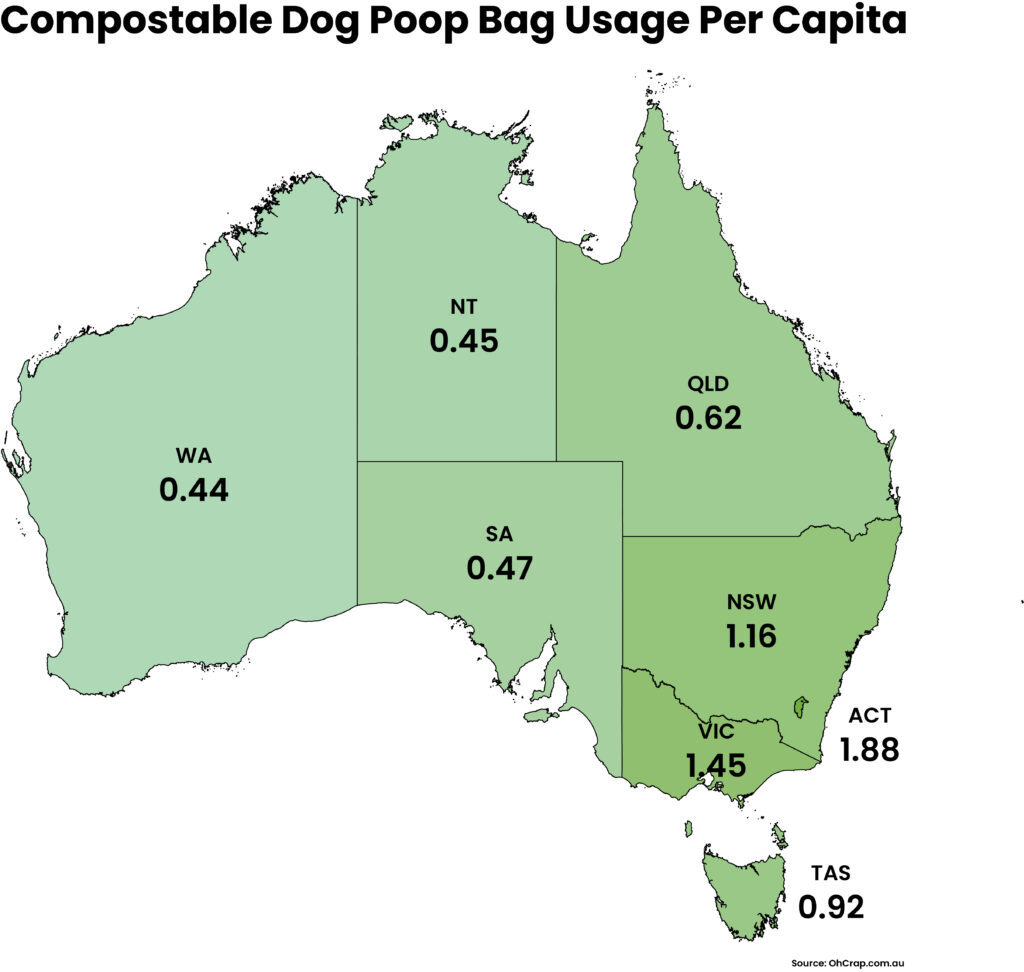
| Rank | State | Avg. Compostable Bags Per Capita |
| 🏆 1 | ACT | 1.88 |
| 2 | VIC | 1.45 |
| 3 | NSW | 1.16 |
| 4 | TAS | 0.92 |
| 5 | QLD | 0.62 |
| 6 | SA | 0.47 |
| 7 | NT | 0.45 |
| 8 | WA | 0.44 |
ACT: The Eco-Champion
The Australian Capital Territory (ACT) is out in front, setting a shining example of what it means to be eco-conscious pet owners. With the highest score in our analysis, ACT residents are truly leading by example, showing that even the smallest community can make a significant impact. It’s clear that in the ACT, being eco-friendly is not just a choice, but a way of life. We’re inspired by their commitment and hope their success encourages more states to follow in their eco-friendly pawprints.
NSW & VIC: Hot on the Trail
New South Wales (NSW) and Victoria (VIC) are not far behind, with their tails wagging enthusiastically in the race towards sustainability. These states have shown impressive strides in adopting compostable dog poop bags, contributing massively to the nationwide effort to reduce plastic waste. The commitment seen in NSW and VIC is commendable, and it’s their continued effort that keeps the momentum going towards a greener Australia.
The Rest of the Pack: Room to Grow
While some states may not be leading the pack just yet, every state has shown a commitment to moving towards more sustainable practices. States ranking lower are not lacking in spirit or dedication; they simply have more room to grow. We believe that with continued education and sharing of resources, every state can climb the ranks. Oh Crap is committed to supporting this journey, providing information and resources every step of the way. Remember, sustainability is a team effort, and every small change contributes to a larger impact.
We’re all in this together, working paw-in-paw towards a future where eco-friendly choices are the norm, not the exception. Let’s celebrate the progress we’ve made and keep pushing forward because every state has the potential to be a leader in sustainability.
Conclusion
As we reach the tail end of our adventure, it’s clear that every small step, or paw print, makes a difference. From the eco-warrior ACT to the potential for growth in QLD and WA, there’s room for all of us to grow, learn, and change. We are all ear’s how we can help in this change, so if you have any ideas of blogs or content that would be helpful to create, please let us know in the comments below.
Feeling inspired? It’s time to turn that inspiration into action. Whether you’re in a leading state or one that’s catching up, every choice to switch to a compostable option is a step toward a greener tomorrow.
Now that you’re armed with the knowledge, we’ve got to ask: How will you contribute to a cleaner, greener planet with your pup? Share your thoughts, stories, or even a tail-wagging selfie with your eco-friendly bag in action. Use the hashtag #OhCrapFamily, and let’s spread the word together!

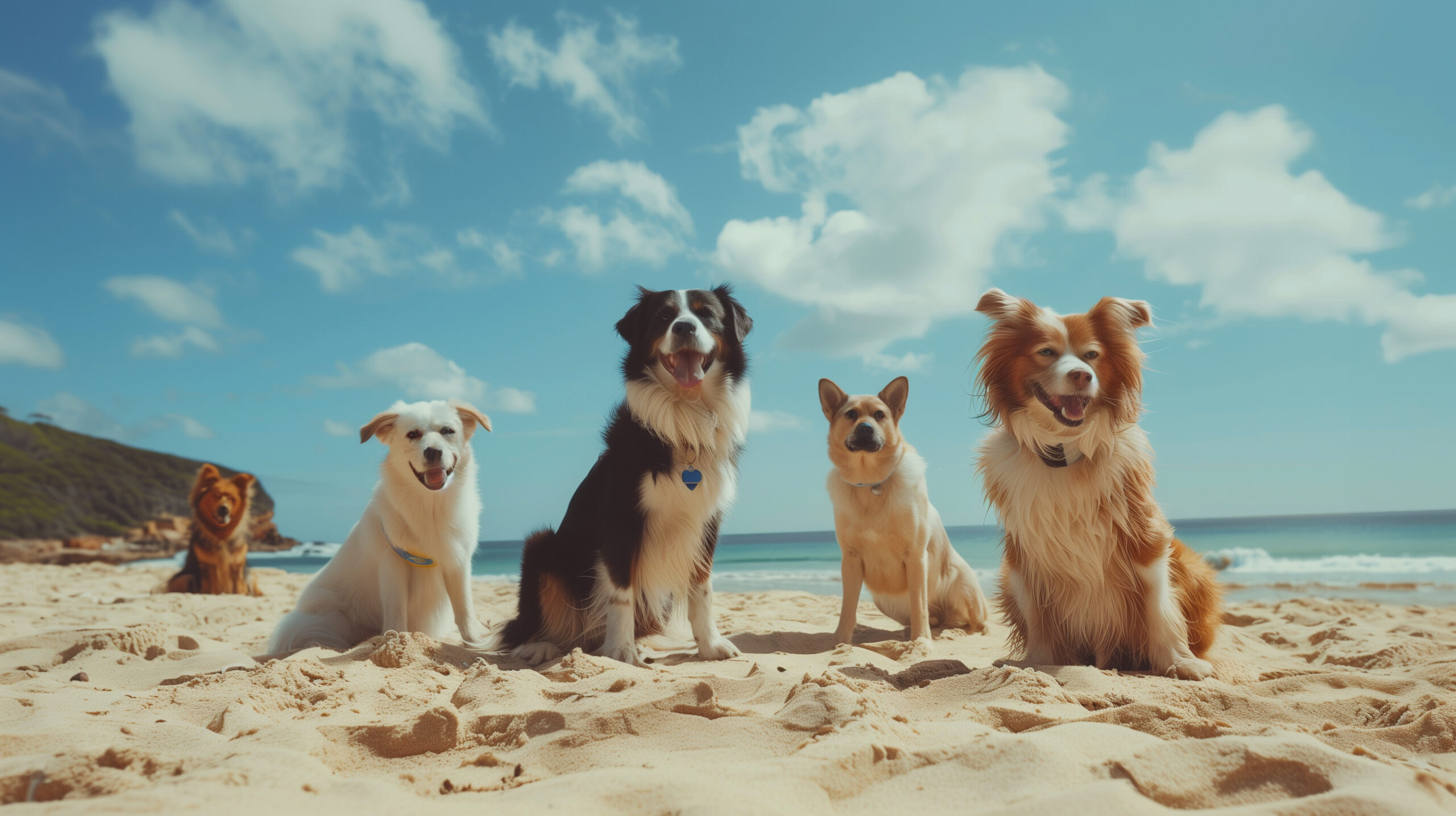
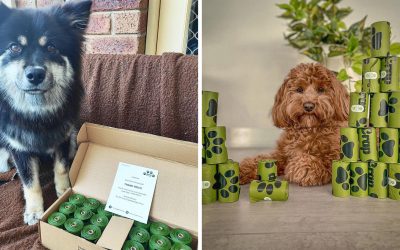
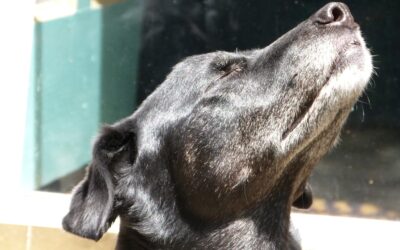

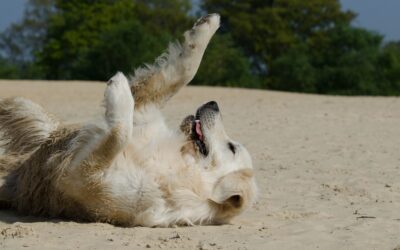
0 Comments